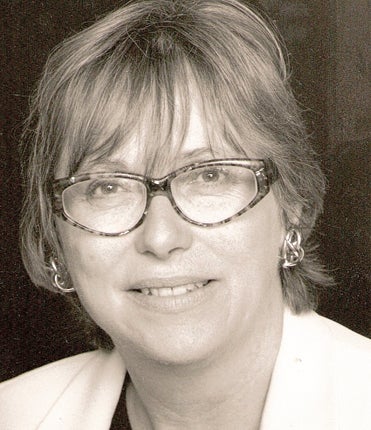Sally Hunt: Energy expert who helped mastermind electricity privatisation in Britain in the 1980s

Sally Hunt was a world-renowned expert on the electricity industry who helped to mastermind the privatisation of that sector in Britain during the late 1980s – a task which many considered impossible to achieve successfully.
Hunt was born in Woking on 9 September 1943. She attended a state primary school and went, on scholarships, to Sutton High School for Girls and Somerville College, Oxford, where she took a degree in philosophy, politics and economics. At the time, the total quota for women students at Oxford University was still one thousand, even though they had been permitted to earn Oxford degrees since 1938.
She began her career in the 1960s as a research assistant at the London School of Economics. She married an American, Richard Streiter, and moved first to Paris and then to New York, where her two sons, Paul Streiter and Mark (Reign) Streiter, were born. In the late 1960s she joined Mayor John V Lindsay's New York City Budget Bureau, working first on education and then on air and water pollution. Her connection with the Bureau was to be a lasting one; in recent years, she was on the selection committee for the Hayes Prize, an annual award given to New York City employees by friends and admirers of Fred Hayes, the Budget director when Hunt first arrived at the organisation. She became assistant commissioner for air pollution control, and during the energy crisis of 1973 she became deputy director of the newly created Energy Office.
Despite passing the requisite New York City Civil Service examination, Hunt was passed over twice for permanent appointment. She asked the Chair of the City Civil Service Commission why; he replied that it would have helped if she were Irish, if she were male, if she were over 40 and if she could drink.
At 30, she left City government and joined NERA, an economic consulting firm with a large specialty in energy. She soon became a vice president, testifying in electricity and other energy regulatory cases all over the US and before congressional committees. She was chief economic investigator on the Montana coal tax case, a constitutional case that went to the US Supreme Court. Seeking electric industry experience, she went to Con Edison as corporate economist in the office of the president, wrestling with regulatory problems. She made sure that she spent every Thursday in the field studying the "real world" of manholes, power stations and transmission towers.
In 1988, NERA won the contract to advise the Central Electricity Generating Board in England on how to privatise the electric industry and introduce competition at the same time. This had never been done anywhere, and most experts considered it impossible. But Hunt's last child was in college; her mother in England was old. It was a perfect fit. She rejoined NERA full time and moved to London.
More than two years and dozens of meetings, drafts and negotiations were required to develop a workable plan – and the plan that emerged has survived remarkably well. The people who constructed it had found a new talent – electricity restructuring. Hunt returned to the US, where she had become a citizen, and was appointed head of the energy practice at NERA and elected to the Board.
Hunt travelled extensively in the following years, advising governments and industry members on how to introduce competition in electricity. She wrote, with Graham Shuttleworth, Competition and Choice in Electricity (Wiley, London 1996), followed by Making Competition Work in Electricity (Wiley, New York 2002). The latter was reviewed in the Journal of Energy Literature, which noted that: "It will undoubtedly become recommended, if not required reading for students, researchers, regulators, and the industry alike."
Hunt consulted in China for 12 years, at the invitation of the World Bank. She also worked at length with the Ministry of Energy in Mexico, helping to draft the white paper on reform of the electric sector, which was published, but went nowhere. She spent much time in California and New Jersey, working with electric utilities as reforms were introduced.
As her sons, Paul and Mark, became parents in Hawaii and Georgia respectively, Hunt decided to retire. At her retirement party she said she had been saving time all her life – and now she planned to spend it, and even waste it. She wanted to develop real relationships with each of her six grandchildren and to visit far-flung friends. She still did occasional consulting, most recently in Turkey for the Ministry of Energy. When cancer was diagnosed, she was glad she had had those years with her family – and at a slower pace.
In addition to her sons, daughters-in-law and grandchildren, Sally issurvived by her husband, Ronald A Twitty, and her sister, Carole Hurst, of Wokingham, England. Her first husband, Richard Streiter, also survives her. Contributions in Sally Hunt's name in the US should go to The Hayes Prize Fund at the Fund for the City of New York; and in the UK to the Somerville College Fund.
William Josephson
Sally Streiter Hunt, corporate consultant: born Woking 9 September 1943; married firstly Richard Streiter (two sons; marriage dissolved), 2009 Ronald A Twitty; died Hawaii 13 September 2010.
Join our commenting forum
Join thought-provoking conversations, follow other Independent readers and see their replies
Comments
Bookmark popover
Removed from bookmarks